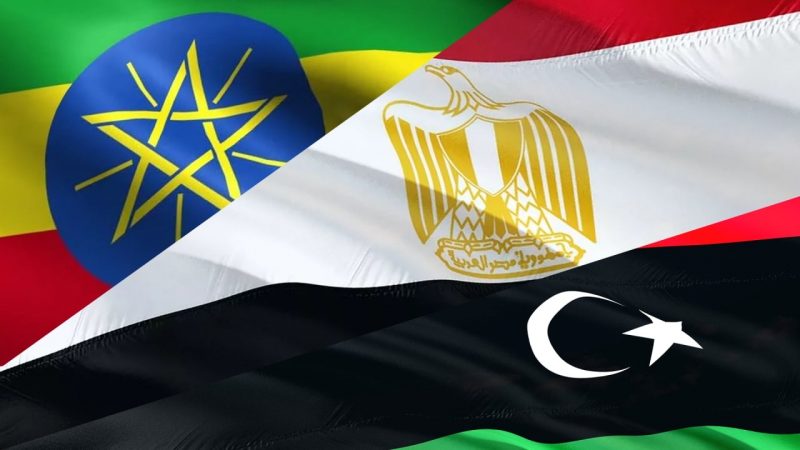By Nardine Ali
A dead end for GERD talks, and a US’s abandonment for Cairo, Khartoum
In a new round of prolonged negotiations, Egypt announced the failure of talks with Ethiopia over the Grand Ethiopian Renaissance Dam (GERD), when Addis Ababa declared on February 10th its determination to commence the second phase of filling of the dam in next July.
In a phone call with his Finnish counterpart on February 14th, Egypt’s Foreign Minister Sameh Shoukry expressed his disappointment on the failure of the African Union (AU) efforts to manage the GERD issue, asserting Egypt’s aspiration to resume talks with the Ethiopian and Sudanese parties.
“A binding, legal deal with Ethiopia must be reached which serves the interests of the three countries [Egypt, Sudan and Ethiopia], before starting the second filling of the dam,” Shoukry said in a statement published on the ministry’s official Facebook page.
Meanwhile, Sudan expressed its full rejection of Ethiopia’s unilateral move to fill in the dam without the consent of the other two downstream countries, saying this will have a dangerous affect on Sudan’s share of the Nile water.
The second phase of the filling will reach 13.5 billion cubic meters of water, the triple amount of the first filling in last July, according to Asharq Alawsat newspaper.
From its side, Egypt started mobilizing an international support for its cause, calling on the AU, the EU, the United Nations Security Council and the USA to back its demands and deter Ethiopia from violating Egypt and Sudan’s rights in Nile water.
On February 20th, the US State Department stated that Washington would de-link its pause on some aid to Ethiopia from its policy on the GERD, according to Ahram Online. At the meantime, the US State Department spokesman Ned Price told reporters that President Joe Biden’s Administration will review US policy on the GERD and assess the role the administration can play in facilitating a solution between the countries.
“We continue to support collaborative and constructive efforts by Ethiopia, Egypt and Sudan to reach an agreement on the GERD”, Price said.
The Egyptian politicians and diplomats downplayed the effect of de-linking the aids to Ethiopia, explaining that the US wants to play the impartial-mediator role. However, halting the aids has not facilitated negotiations in the past, nor forced Ethiopia to respect its obligations toward neighbors, according to Almasry Alyoum.
The Biden Administration will not take a supportive stance towards Egypt regarding the dam dispute on the short term, said the former Egyptian Foreign Minister Nabil Fahmy, explaining that Biden will focus on domestic issues in the first six months in the office.
On the other hand, the Chairperson of the AU, Congolese President Félix Tshisekedi, affirmed repeatedly his support to Egypt and Sudan’s stance and to reach an lasting solution for the dam dispute. Earlier in February, he paid a visit to Cairo, where he met President Abdel Fatah Al Sisi, who promised increasing the trade scale between Egypt and Congo and upgrading the Egyptian investment in the African country.
Congo’s mediation is tied to two factors, according to the African affairs expert Attiya Eissawy. First is Congo’s ability to offer alternative solutions to facilitate negotiations for all parties, and second is Ethiopia’s flexibility and readiness to revive the negotiation process.
“I believe that the situations is not promising”, Eissawy told Sky News Arabia on February 7th, explaining that Addis Ababa’s has not changed its stance, as it rejected the US’ and International Bank-brokered negotiations, and blamed Cairo and Khartoum for failure of talks. Another reason is, according to Eissawy, Congo’s weak diplomatic capabilities inside the African continent, as it lacks pressure cards to convince any of the conflict’s parties to make concessions for a solution.
Meanwhile, the Kingdom of Saudi Arabia proposed itself as a negotiations’ broker in a way that preserves the Arab “water security”, reports the independent Egyptian website Masrawy.
Following a meeting with the Sudanese Prime Minister Abdalla Hamdok on February 17th, the Saudi State Minister for African Affairs, Ahmed Kattan stated that the Kingdom will later call for a special summit for the Council of the Arab and African countries of the Red Sea and the Gulf of Aden, formed last year in Saudi Arabia.
Libyan interim government seeks Cairo’s blessing
For his second visit abroad as the newly designated Prime Minister of Libya, Abdul Hamid Dbeibah headed to Cairo on February 18th to meet with President Abdel Fatah Al Sisi, where both leaders discussed the country’s course back on the right path after years of conflict between the rivals in eastern and western Libya.
Dbeibah expressed in Cairo his appreciation to Egypt’s sincere efforts on all levels to resolve the Libyan crisis, culminating in rapprochement between the warring parties, where he highlighted Egypt’s role in eliminating the role of extremist groups in Libya, according to Asharq Al-Awsat news.
For his part, Sisi expressed Cairo’s readiness to offer its expertise to its Libyan brothers to help them return their country on the right path and pave the way for development and stability, according to a statement from the presidency.
The talks between the two leaders tackled Libyan efforts to lead the transitional phase and the cooperation between Libya and Egypt, where both sides agreed to hold further talks especially on restoring services and security, as well as boosting economic cooperation.
Dbeibeh’s visit to Cairo was expected, as local media said that he had paid a secret visit to Turkey on February 10th, where he met with President Recep Tayyip Erdogan. And concluding his travel to Cairo, Dbeibeh headed to Tobruk City in his first visit to eastern Libya to meet the Speaker of the Libyan House of Representatives, Aguila Saleh. Here, an upcoming session, to be held in Sirte, in order to approve the new Libyan government was discussed.
Its worth mentioning that the three competing rivals in Libya, Egypt, UAE and Turkey, have all hailed the new government, affirming that it is the right step to end the war in the country and achieve stability and unity.
Speaking about Egypt’s vital role in Libya, the Libyan expert Mohamed Elzaidy praised Cairo’s political intelligence and diplomatic flexibility that earned the confidence of all Libyan fractions, a matter of fact that played a significant role in these tough periods.
The political analyst added that restoring the relations with Tripoli was not a surprise for anyone in Egypt or Libya, because Egypt has always backed a peaceful solution in Libya, instead of declaring war against any party; it rather sided with the security and stability of Libya against terrorists and foreign mercenaries who threatened the fate of the Libyan territories.
“Despite suffering from the chaos in Libya, Egypt has never took a foolish step or rushed into a situation in Libya,” Libyan researcher Ahmed Hamza told Sky News Arabia.
On February 17th, Egypt’s Foreign Minister Sameh Shoukry said his country is evaluating to reopen its embassy and consulate in Libya after seven years of closure.
Shoukry added that “an Egyptian delegation made up of representatives from the Foreign Ministry and security bodies has been sent to Libya to explore the possibility of resuming the Egyptian diplomatic presence in the Libyan capital Tripoli, as well as the consular presence in Benghazi”, according to Ahram Online.









Leave a Reply